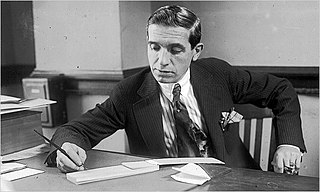Related Research Articles

Charles Ponzi was an Italian swindler and con artist who operated in the U.S. and Canada. His aliases included Charles Ponci, Carlo, and Charles P. Bianchi.

A Ponzi scheme is a form of fraud that lures investors and pays profits to earlier investors with funds from more recent investors. Named after Italian businessman Charles Ponzi, the scheme leads victims to believe that profits are coming from legitimate business activity, and they remain unaware that other investors are the source of funds. A Ponzi scheme can maintain the illusion of a sustainable business as long as new investors contribute new funds, and as long as most of the investors do not demand full repayment and still believe in the non-existent assets they are purported to own.

A pyramid scheme is a business model that recruits members via a promise of payments or services for enrolling others into the scheme, rather than supplying investments or sale of products. As recruiting multiplies, recruiting becomes quickly impossible, and most members are unable to profit; as such, pyramid schemes are unsustainable and often illegal.

Edwin Atkins Grozier was an American journalist, publisher and author, who owned The Boston Post from 1891 until his death. He authored the book, "The Wreck of the 'Somerset,'" first published in the New York World, May 1886.

A charlatan is a person practicing quackery or a similar confidence trick in order to obtain money, power, fame, or other advantages through pretense or deception. Synonyms for charlatan include shyster, quack, or faker. Quack is a reference to quackery or the practice of dubious medicine, including the sale of snake oil, or a person who does not have medical training who purports to provide medical services.

Clarence W. Barron was one of the most influential figures in the history of Dow Jones & Company. As a career newsman described as a "short, rotund powerhouse", he died holding the posts of president of Dow Jones and de facto manager of The Wall Street Journal. He is considered the founder of modern financial journalism.
Reed Eliot Slatkin was an initial investor and co-founder of EarthLink and the perpetrator of one of the largest Ponzi schemes in the United States since that conducted by Charles Ponzi himself.
A high-yield investment program (HYIP) is a type of Ponzi scheme, an investment scam that promises unsustainably high return on investment by paying previous investors with the money invested by new investors.
A credit crunch is a sudden reduction in the general availability of loans or a sudden tightening of the conditions required to obtain a loan from banks. A credit crunch generally involves a reduction in the availability of credit independent of a rise in official interest rates. In such situations, the relationship between credit availability and interest rates changes. Credit becomes less available at any given official interest rate, or there ceases to be a clear relationship between interest rates and credit availability. Many times, a credit crunch is accompanied by a flight to quality by lenders and investors, as they seek less risky investments.
Thomas Joseph Petters is a former American businessman and chairman and CEO of Petters Group Worldwide, a company which stole over 2 billion dollars in a Ponzi scheme. He was convicted of massive business fraud in 2009 and is now imprisoned at the United States Penitentiary, Leavenworth. Amid mounting criminal investigations, Petters resigned as his company's CEO on September 29, 2008. He was convicted of numerous federal crimes for operating Petters Group Worldwide as a $3.65 billion Ponzi scheme and received a 50-year federal sentence.

Bernard Lawrence Madoff was an American fraudster and financier who ran the largest Ponzi scheme in history, worth about $64.8 billion. He was at one time chairman of the NASDAQ stock exchange. He advanced the proliferation of electronic trading platforms and the concept of payment for order flow, which has been described as a "legal kickback".
Control fraud occurs when a trusted person in a high position of responsibility in a company, corporation, or state subverts the organization and engages in extensive fraud for personal gain. The term "control fraud" was coined by William K. Black to refer both to the acts of fraud and to the individuals who commit them.
Eric J. Swanson is an American lawyer who worked at the U.S. Securities and Exchange Commission (SEC) and dated and eventually married the niece of Bernard Madoff while the SEC was investigating Madoff's investment firm for what was eventually revealed to be a massive Ponzi scheme. Swanson is currently the Senior Vice President, General Counsel, and Secretary of BATS Global Markets, the third-largest stock exchange in the United States.

Simon Swig was an American banker, politician and philanthropist.

Richard Grozier (1887–1946) was the owner, publisher and editor of The Boston Post from 1924 until his death. He inherited the paper from his father, Edwin Grozier. While he was acting publisher in 1920, The Boston Post received one of the first Pulitzer prizes for exposing Charles Ponzi as a fraud.
Leopold Koretz (1879–1925) was an American lawyer and stockbroker who ran an elaborate Ponzi scheme in Chicago, called the "Bayano oil fraud", which garnered an estimated $30 million from dozens of investors in Chicago. The scheme used fraudulent claims of oil interests in Panama in a criminal career that predated his contemporary, Charles Ponzi. Koretz was so trusted and admired that after Ponzi's fraud was exposed in 1920, his investors nicknamed him "Our Ponzi," never suspecting they were being duped as well.

The 1936 Massachusetts gubernatorial election was held on November 3, 1936.
William Henry McMasters was an American journalist and publicist who exposed Charles Ponzi as a fraudster.
References
- ↑ Zuckoff, Mitchell (10 January 2006). Ponzi's scheme - the true story of a financial legend. New York: Random House Trade Paperbacks. ISBN 0812968360.
- ↑ Robert Palestini (2 December 2011). Leadership with a Conscience: Educational Leadership as a Moral Science. R&L Education. p. 101. ISBN 978-1-61048-395-7.